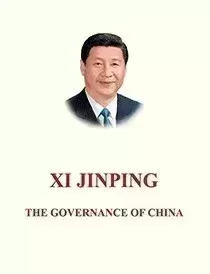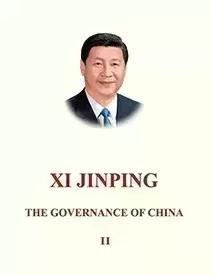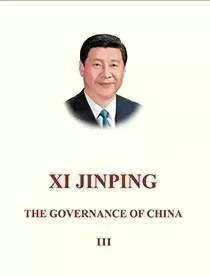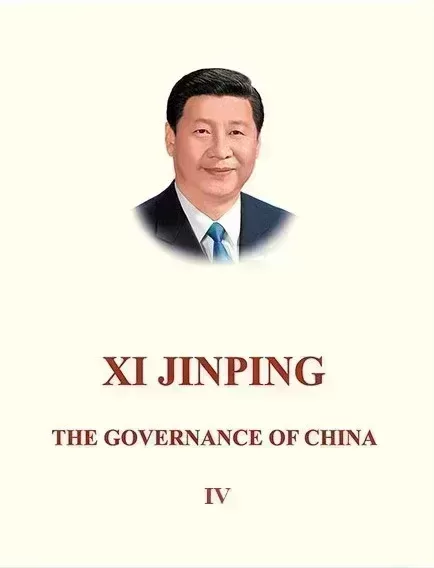
The Governance of China, Volume I
Xi Jinping

The Governance of China, Volume II
Xi Jinping
(2017)

The Governance of China, Volume III
Xi Jinping
(2020)

The Governance of China, Volume IV
Xi Jinping
(2022)
« When he speaks in Chinese it doesn’t do anything for me, » a colleague tells me, « but when I read it in English like this, it’s already a lot more bearable. Maybe he thinks in English and things always go wrong in the Chinese translation! »
She’s a colleague at the art academy in Beijing where I teach, and is flipping through my copies of The Governance of China, Volumes I to IV (2014, 2017, 2020, 2022). The author is General Secretary Xi Jinping, whose term in office is now indefinite due to a 2018 constitutional amendment. The volumes run to 2440 pages and anthologize ten years of 392 collected speeches, comments and interviews. In 2014, a riot erupted in the US because Volume I had been spotted on Mark Zuckerberg’s table. Zuckerberg had also, it was said, ordered ample copies for colleagues. Henry Kissinger swears by them. Prince Andrew of the British royal family considers them a « landmark ». China experts agree that this collection of four volumes (so far) is a must-have for those who want to know where China is going in this century. It must have sold millions of copies by now, at least in China. Sales in Europe aren’t clear — maybe only a few hundred copies, according to The Economist. It is ranked 18.867 in the German Amazon’s top foreign Bestseller-Rang. If you think China is the most important country of our shared global future and if you accept Xi Jinping as its most important political figure, then these are the most important unread books of our times.
I’ve now devoted several months, on and off, to plowing through all four volumes. One of the top reviews on Amazon suggests that the books are hard work. And they are. Years ago I heard from friends in China that soldiers and other government officials are required to read them online and have to give a sign of life every twenty minutes to prove they haven’t dozed off. Others tell me that in post-Covid China, higher echelons of the Communist party are sent more and more on study trips in which reflection on the book is mandatory.
This article is behind the paywall. Want to keep reading this article?
Subscribe to the European Review of Books, from as low as €4,16 per month.
Already a subscriber? Sign in
- Once at a book fair, a Dutch diplomat in China showed me the covers of all the translations, and they are all designed in exactly the same style. The Spanish edition’s over-long title is squeezed into the same line, making it almost impossible to read. Most translations of the title itself are quite literal, except for the German: China regieren, or Governing China, which somehow sounds more active and more personal. ↩︎
- « Develop Philosophy and Social Sciences with Chinese Features », 17 May 2016 ↩︎
- « Transition to Innovation-Driven Growth », 9 June 2014 ↩︎
- « Exchanges and Mutual Learning Make Civiliations Richer and More Colorful », 27 March 2014 ↩︎
- « Meet the People’s Expectation for a Better Life », 1 December 2017 ↩︎
- « Move Faster to Create a New Development Dynamic », 11 January 2021 ↩︎
- « Increase Confidence and Overcome Difficulties to Build a Better World. » 21 September 2021 ↩︎
- « Be the Spine of Our Party », 1 September 2021 ↩︎